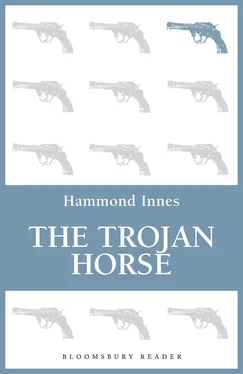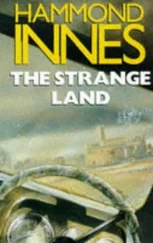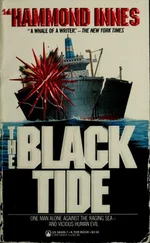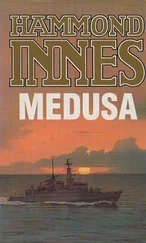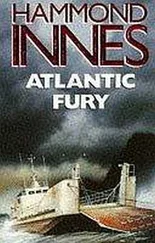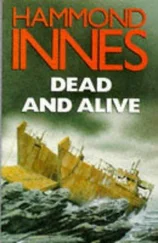Hammond Innes - The Trojan Horse
Здесь есть возможность читать онлайн «Hammond Innes - The Trojan Horse» весь текст электронной книги совершенно бесплатно (целиком полную версию без сокращений). В некоторых случаях можно слушать аудио, скачать через торрент в формате fb2 и присутствует краткое содержание. Жанр: Прочие приключения, на английском языке. Описание произведения, (предисловие) а так же отзывы посетителей доступны на портале библиотеки ЛибКат.
- Название:The Trojan Horse
- Автор:
- Жанр:
- Год:неизвестен
- ISBN:нет данных
- Рейтинг книги:4 / 5. Голосов: 1
-
Избранное:Добавить в избранное
- Отзывы:
-
Ваша оценка:
- 80
- 1
- 2
- 3
- 4
- 5
The Trojan Horse: краткое содержание, описание и аннотация
Предлагаем к чтению аннотацию, описание, краткое содержание или предисловие (зависит от того, что написал сам автор книги «The Trojan Horse»). Если вы не нашли необходимую информацию о книге — напишите в комментариях, мы постараемся отыскать её.
The Trojan Horse — читать онлайн бесплатно полную книгу (весь текст) целиком
Ниже представлен текст книги, разбитый по страницам. Система сохранения места последней прочитанной страницы, позволяет с удобством читать онлайн бесплатно книгу «The Trojan Horse», без необходимости каждый раз заново искать на чём Вы остановились. Поставьте закладку, и сможете в любой момент перейти на страницу, на которой закончили чтение.
Интервал:
Закладка:
‘I see you recognise me,’ he said, as he sat down opposite me. His eyes held mine. They were large and dark and strangely bright. He looked like a dealer in second-hand clothes, with his sallow face blued about the jowl by the stubbly growth that had once been his beard, and his ill-fitting clothes. But, looking into those dark eyes, I saw only the intelligence of the man. Behind this nondescript exterior was a great brain and I began to have a horrible doubt. Yet when he spoke he seemed sane enough. He apologised again for forcing his way into my room. His voice was soft and musical and very quaint, with its accent coloured by Austrian and Welsh and the usual handicap of people of his race. ‘I feared,’ he explained, ‘that your natural instinct as a citizen might override adherence to the code of your profession. I hope you will accept my apology.’
I nodded. I took out my case and lit a cigarette. I could feel his eyes watching me.
‘I am accused of a particularly callous and brutal crime,’ he went on. ‘If I had done it, I could have expected mercy from no one. I trust you will pardon me for fearing that you might be over-hasty in your judgement. I have a particular reason for not wishing to fall into the hands of the police yet. I have come to you because I must confide in someone — in someone upon whose discretion I can rely. It had to be someone, moreover, whose opinion carried some weight in official quarters.’
At that I stopped him. ‘Even if you were to convince me that you are innocent of this crime,’ I said, ‘it is not in my power to persuade the police — nothing short of a direct alibi will do that.’
He shook his head slowly and his rather full lips twitched into a wry smile. ‘That is not the reason I came to see you,’ he said. ‘Though I shall hope that, if the time comes, you will agree to defend me. No, I came here because, having followed your cases closely — in my leisure hours I have been something of a student of criminology — I considered you to be a man of sufficient discrimination to know the truth when you heard it. I considered you also a man of great determination — more, of great tenacity — once convinced of the justice of a cause. The obstinate tenacity of your nature is the secret of your success at the bar. You will pardon this analysis of your career. I was endeavouring to explain why I had come to you. I have a story to tell that few men would believe, very few indeed, coming as it does from the lips of a man who is supposed to have committed a particularly brutal murder. But you have had great experience of criminals and some understanding of murderers. If you do not believe me, no one will. But I feel that, if I can convince you, there will be one man of unimpeachable honesty who will not rest until he has exposed the cancerous growth that is bedded deep in the heart of this great country.’
Towards the end he had grown somewhat excited and I was conscious all the time of those dark bright eyes fixed unblinkingly upon me. ‘You speak in riddles,’ I said. ‘Perhaps you will be a little more explicit.’
Then he told me his story. It was a strange fantastic tale. And when he left me I could not decide whether it was the story of a madman, or the truth. It had to be one or the other, for I was convinced that it was the truth as far as he saw it. But whether the strain of the last few years had snapped a great brain or whether all that he had told me had actually happened, I could not decide. But this much I knew. It was not so strange or fantastic a story that it could not have happened. And whilst logic rejected it as the tale of a man whose brain had become unbalanced, my knowledge of psychology argued that the quiet, straightforward manner in which he had told it to me was proof of its reality.
It had not been just a story of the murder. It had been his whole life-story. Sitting there in the chair opposite my desk, with the firelight playing on his face, he had been sufficiently convincing for me to agree not to tell the police anything for a week, when he would come and see me again.
But it was the end of his story that had weakened my faith in the rest. He had risen to go. And his voice became suddenly excited and his eyes blazed with the light of the fire in them. ‘If I shouldn’t come to you next Monday,’ he said, ‘will you go round to my lodgings and take the face from the barbican? You are clever. You will understand. The clue is cones of runnel.’ After the quiet matter-of-fact way he had told me his strange but consistent story, this departure into the melodramatic came as something of a shock.
I told him so and he smiled that rather wry tired smile and said, ‘I don’t believe you will think so next Monday. I have a feeling that I shall not see you again.’
‘But when the police catch you, I will come and see you, and we will arrange about your defence.’
He shrugged his shoulders. ‘Maybe,’ he said. ‘It is good of you. But it is not the police I fear. When I told you there was someone else after the plans beside the Calboyd Diesel Company, I meant it. Germany wants them too. They discovered I was not dead and what Fritz Thessen had told them whetted their appetites. But if I told you who their agents in this country were, you would laugh at me and I should be discredited in your eyes. But when I am dead, you will know it, and then you will know who murdered my friend Llewellin. Goodbye, Mr Kilmartin.’ He held out his hand and, as I shook it, he said, ‘I cannot thank you enough for listening to me so patiently. I shall hope to see you next Monday. If not, I have your promise to go round to my lodgings?’
His face was perfectly serious. I nodded. I could do nothing else. His grip on my hand tightened. ‘I think you will find it is not a case for the police — at first.’ Then he fished in his pocket and pulled out an envelope. ‘That is a letter for my daughter, Freya, when you find her. The address of my lodgings is written in the corner.’ He put it on my desk and, replacing his glasses and picking up his bowler hat, turned and went out of my office.
I sat down and tried to puzzle it out over a cup of tea. The man’s story was convincing, at any rate in part. I couldn’t believe he was a murderer. His point about Evan Llewellin being a bigger and younger man than himself, and the impossibility of his having held him under the drill with one hand while he operated it with the other, was sound enough. And yet it was fantastic. All that about Nazi agents after his diesel engine plans and the murder being a frame-up to get him out of the way. If they had wanted him out of the way and were prepared to kill a man to achieve their ends, it would surely have been much simpler and much surer to have killed him? Who was he suspecting of being a Nazi agent that I should laugh at the accusation? And all that rigmarole about how the Calboyd Diesel Company had queered his pitch at the Air Ministry by saying they had tested his engine and considered him a crank. The story was real enough to him. Of that I was certain. But he saw events with a distorted mind. Up to the time of his escape from the concentration camp the story was certainly accurate, but the rest, though based on truth, seemed to have been coloured by an unbalanced mind. God knows what he had suffered in that concentration camp! He had not gone into details about those two months. But, judging by what I had heard of other such camps, it would have been sufficient to affect the balance of a sensitive and brilliant mind.
But then there was that point about Llewellin being stronger than he. On a sudden impulse I picked up the phone and asked my typist to try and get me Inspector Crisham at the Yard. Crisham was in and knew enough about the case to answer my query. ‘We realised that difficulty,’ he said. ‘But the men were on friendly terms and it wouldn’t have been impossible for Schmidt to get Llewellin to bend down to examine something under the drill. Part of a gun-mounting was found under it. More probably Llewellin bent down to adjust something and Schmidt seized his opportunity and pulled the drill lever over. What’s your interest in the case?’ I explained hastily that it had interested me and I wanted to clear up a point that had been worrying me. I rang off before he could ask any more questions.
Читать дальшеИнтервал:
Закладка:
Похожие книги на «The Trojan Horse»
Представляем Вашему вниманию похожие книги на «The Trojan Horse» списком для выбора. Мы отобрали схожую по названию и смыслу литературу в надежде предоставить читателям больше вариантов отыскать новые, интересные, ещё непрочитанные произведения.
Обсуждение, отзывы о книге «The Trojan Horse» и просто собственные мнения читателей. Оставьте ваши комментарии, напишите, что Вы думаете о произведении, его смысле или главных героях. Укажите что конкретно понравилось, а что нет, и почему Вы так считаете.
